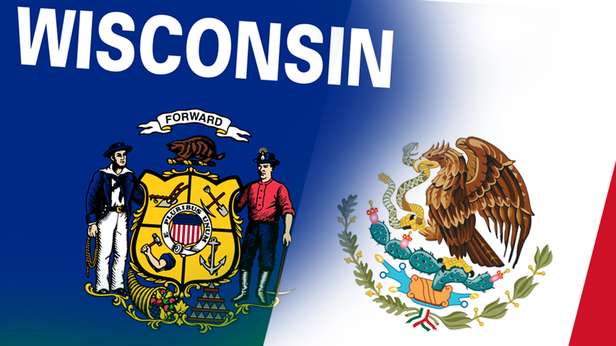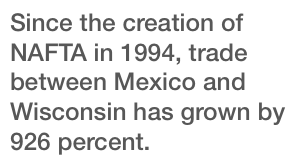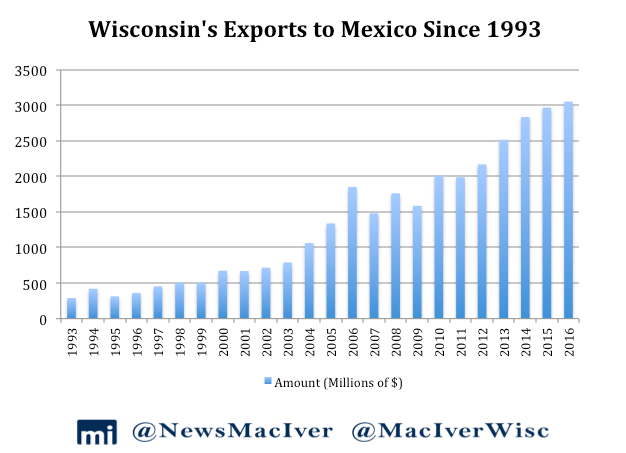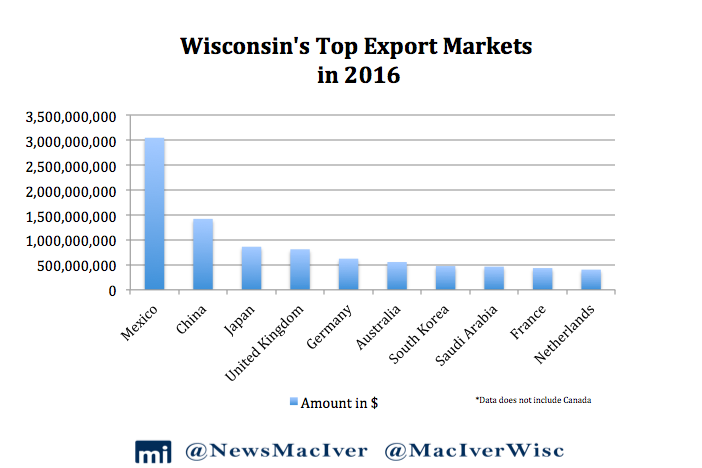
Trade between Mexico and Wisconsin up 926% thanks to free trade policies
August 1, 2017
By Matt Tragesser
[Madison, Wis…] This past June, Lt. Gov. Rebecca Kleefisch traveled south of the border to strengthen the economic relationship between Wisconsin and Mexico, a growing interest the Badger State has had for the last 20 years.The week-long trade mission featured stops in Mexico’s two largest economic hubs of Mexico City and Monterrey, with officials from the Wisconsin Economic Development Corporation (WEDC) joining Kleefisch to promote Wisconsin industries.
With the adoption of the North American Free Trade Agreement (NAFTA) in 1994, trade between Mexico and Wisconsin has grown by 926 percent thanks to low trade barriers including minimal tariffs and overall little government intervention.
In just two decades, Mexico has become Wisconsin’s second largest export market in the world, with exports totaling more than the state’s exports to China, Japan, and Germany combined. This past year alone, trade with Mexico generated $3 billion for Wisconsin and accounted for 15 percent of all exports, an all-time high.
Despite being known as the dairy state, Wisconsin’s top exports to Mexico last year were motor parts and battery waste, followed by centrifuge parts and soybeans.
Increased free trade with Mexico has certainly sparked enormous economic growth for Wisconsin. Apart from the revenue generated from exports, 96,000 jobs in the state have been created or rely heavily on trade with Mexico. Nearly 5,000 of these jobs have been brought to Wisconsin by Mexican companies.
“Mexico is a vital partner to grow businesses and add jobs here in our state. As we’ve recently seen, Wisconsin is a top target for foreign direct investment that can create jobs and factories in our communities,” Lt. Governor Kleefisch told the MacIver Institute.
Free trade between Wisconsin and Mexico has also brought a larger variety of lower-cost products to Wisconsin. Since free trade creates an environment where companies specialize in products that they can cheaply produce in high volumes, goods become less expensive for consumers.
For example, motor vehicles in Wisconsin have become more affordable thanks to trade with Mexico. With a large labor force whose average wage is much lower than other countries, thanks to a very low cost of living, Mexico has become a hot market for vehicle assembly. In Mexico, a worker for a standard car manufacturer will make about $8 an hour, while a worker in the United States can make close to $60 an hour. Mexico’s lower average wage leads to lower prices for Wisconsinites and explains why motor vehicles remain one of Wisconsin’s top imports for 2016.
Importing lower cost products from Mexico has become popular in Wisconsin. Just last year $2.7 billion worth of goods were imported from our southern neighbor. Electric storage batteries, motor vehicles, and tractors were the state’s most popular imports in 2016.
Future trade between the two regions looks promising. Of Wisconsin’s current top 10 export markets, Mexico was only one of two countries that showed positive export growth in 2016. Since 2014, Wisconsin’s increase in sales to Mexico has been larger than its sales to any other country on the entire planet.
Mark Maley, WEDC’s Public Affairs and Communications Director, told the MacIver Institute that Mexico offers many business opportunities for Wisconsin and expects the relationship to continue in the future.
“Wisconsin and Mexico share a mutually beneficial and comprehensive trade and investment relationship. We have hosted three trade trips to Mexico in the last two years to help state businesses find new markets for their products, to encourage Mexican businesses to invest in Wisconsin, and to strengthen industry collaboration between Wisconsin and Mexico in areas such as advanced manufacturing, water technology, and food and beverage production and processing,” he said.
Despite having the pieces and mutual interest to strengthen trade in the future, the partnership could face some troubles within the next year. President Donald Trump aims to renegotiate NAFTA and potentially add a 20% import tariff on all Mexican goods to help fund his proposed border wall. These changes could hinder trade between both regions and ultimately hurt Wisconsinites and Mexicans.
With tensions high at the moment between the United States and Mexico, it is important to recognize the positive impact our southern neighbor has had on Wisconsin’s economy. With billions of dollars generated in sales, more job opportunities, and lower-cost products, free trade with Mexico promises to benefit Wisconsin workers and consumers into the future.

